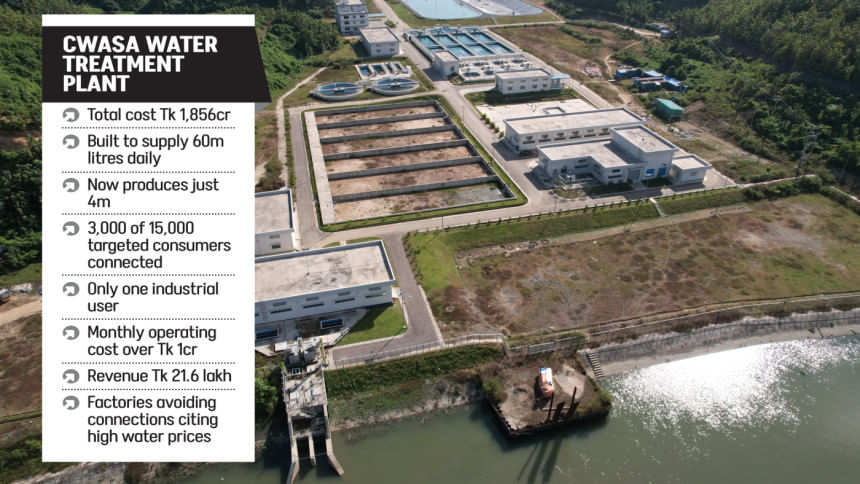Even eight months after its inauguration, the Tk 1,856-crore Bhandaljuri Water Treatment Plant of Chattogram Wasa in Boalkhali upazila is operating at only seven percent of its capacity due to a lack of consumer connections.
As a result, the plant's operational costs fall far short of its expected revenue.
The facility is capable of producing 60 million litres of water daily after collection from the Karnaphuli river and subsequent treatment. Of this, 16 million litres were meant for residential use. The remaining 44 million litres, or about 73 percent of the total capacity, were intended for industrial consumers.
However, it currently produces only about four million litres of water a day.
To supply water beyond its main jurisdiction, CWasa built the plant with 133 kilometres of pipelines to deliver water to around 15,000 residential and commercial consumers across four upazilas -- Patiya, Anwara, Boalkhali, and Karnaphuli.
So far, only around 3,000 consumers have taken connections, including just one industrial connection.
The plant's monthly operational expenses exceed Tk 1 crore, while revenue from water sales barely reaches Tk 21.6 lakh per month at CWasa's rate of Tk 18 per 1,000 litres.
Mahbubul Alam, the project director, said the plant's operational costs were Tk 1.38 crore in May, Tk 1.18 crore in June, and Tk 1.16 crore in July. Over these three months, the plant produced an average of four million litres daily, amounting to about 120 million litres per month. The plant currently has 25 people working there.
Muhammad Rashidul Hasan, dean of the Faculty of Architecture and Planning at Chittagong University of Engineering and Technology, said the feasibility assessment of the project was inadequate. "Had it been conducted properly, the project would not be struggling to attract consumers today. It serves as a costly lesson -- a reminder that building first and planning later can undermine even the best intentions," he added.
Mahbubul Alam, however, said, "We mainly targeted providing water to factories. Each factory's water demand was surveyed to this end. There was no mistake in the feasibility assessment."
He said that residents and industries in Patiya, Karnaphuli, and Anwara upazilas are still using groundwater.
"If this continues, the groundwater level will decrease, and result in saltwater entering the aquifers, shortage of fresh water, and even sinking of land in the long run," he said.
Mahbubul, also superintendent engineer at CWasa, said the factories are not taking water connections, citing higher prices for CWasa's water. "So, we cannot run the plant at its full capacity," he said.
One of the plant's potential major consumers was Chattogram Urea Fertilizer Limited (CUFL), which requires around 20 million litres of water daily.
However, the company has yet to start purchasing water from CWasa.
CUFL managing director Mizanur Rahman said, "We are not taking CWasa's water as its price is much higher compared to what we produce ourselves. We plan to buy some water from them on a regular basis once our production resumes."
Akhtar Kabir Chowdhury, a citizen rights activist, alleged that the purpose of this project was never genuine development, rather it was designed to waste public money.
The project director, however, claimed that current operational costs are being borne by the plant's construction company under the maintenance contract for one year after completion.
The Executive Committee of the National Economic Council approved the project in January 2016 with an initial allocation of Tk 1,036 crore. Later, the cost rose by Tk 820 crore and the deadline extended to June 2025. It was inaugurated in February this year.
Of the total cost, the Korean Exim Bank's Economic Development Cooperation Fund provided Tk 1,224 crore, while the rest by the government.

